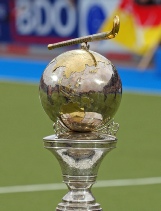






Year
Location
Winner
1971
Barcelona
Pakistan
1973
Amstelveen
Netherlands
1975
Kuala Lumpur
India
1978
Buenos Aires
Pakistan
1982
Mumbai
Pakistan
1986
London
Australia
1990
Lahore
Netherlands
1994
Sydney
Pakistan
1998
Utrecht
Netherlands
2002
Kuala Lumpur
Germany
2006
Monchengladbach
Germany
2010
New Delhi
Australia
Year
Location
Winner
1974
Mandelieu, France
Netherlands
1976
Berlin
W. Germany
1978
Madrid
Netherlands
1981
Buenos Aires
W. Germany
1983
Kuala Lumpur
Netherlands
1986
Amstelveen
Netherlands
1990
Sydney
Netherlands
1994
Dublin
Australia
1998
Utrecht
Australia
2002
Perth
Argentina
2006
Madrid
Netherlands
2010
Rosario
Argentina
Past World Cups
Women’s World Cup
A Potted History of the Hockey World Cups
During the 1960s a debate was going on around the world about the increasing size and cost of the Olympic Games. Many suggestions were made as to how the Games could be made more manageable and one suggestion was the removal of the team games, including hockey. The Olympic Games was (and for many people still is) the showpiece tournament in the hockey calendar and its loss would have meant that hockey would no longer have what was effectively a world championship. And so the decision was made that hockey, in common with many other sports, should have its own World Cup.
The proposal did not receive universal support. Many felt that it would propel hockey into a more professional era at a time when hockey was an amateur sport and proud of it. Nevertheless, the International Hockey Federation (FIH) decided to go ahead and the first ever World Cup was scheduled to take place in 1971 in Karachi, Pakistan. Unfortunately, politics got in the way, and Pakistan had to withdraw its offer, and the tournament was moved to the Real Club de Polo in Barcelona. However, Pakistan did have the honour of lifting the trophy that they had generously donated.
The next two World Cups were played bi-annually, with the Dutch playing hosts in 1973 and the tournament going to Malaysia in 1975. Thereafter the tournament was played every four years, midway in each Olympic cycle. England first entered the World Cup in 1973 was not particularly successful until 1986. Until then it had recorded two 6ths, a 7th and a 9th place.
The 1980s saw a change in the hockey fortunes for both England and Great Britain. 1986 was the centenary year of the Hockey Association (HA), which was then the governing body for men’s hockey in England. As early as 1971 the HA had approached the International Hockey Federation with a bid to host the 1986 World Cup as part of the centenary celebrations. And so it happened that a small and not very impressive sports stadium in Willesden, North London, was converted into a magnificent venue for the sixth World Cup, which was the first to be played on an artificial surface.
It should not be underestimated the impact the 1986 World Cup had on our sport in England. The tournament received extensive television coverage, even pushing soccer out of the schedules. Many ordinary male club players, who had been shy about admitting they were playing a “girls’ game”, suddenly found widespread acceptance of their sport. The image of hockey was helped by an exciting semi-final between England and Germany, followed by an equally exciting final between England and Australia , which unfortunately England lost 2-1.
Although hockey in England was propelled into the modern era by the 1986 World Cup, in many ways it was ill-prepared for the influx of new players generated by the successes of England and Great Britain in the 1980s, and many drifted away after a few years leaving some clubs struggling to survive. The initial interest shown by the media and sponsors was also short lived.
The World Cup continued to be a highly successful tournament but England slipped out of the top rankings after the 1980s and finishing 6th or 7th became the norm for England for many years.
So far our story has been about the Men’s World Cup, and we’ll have a look at the women’s in a moment. But, in important development, 1998 saw the men’s and women’s tournaments held together for the first time. The venue was Utrecht in The Netherlands, where the Dutch took over the local football stadium and converted it into a superb hockey venue for the duration of the tournament. The use of a football stadium to host the tournament in being replicated at the 2014 World Cup where the home of ADO Den Haag in The Netherlands in being used.
England’s fortunes seemed to be on the rise when the Men’s World Cup was held in a brand new purpose-built stadium in Monchengladbach, Germany, in 2006. England finished fifth, their best result since 1990. In 2010 in Delhi they went one better, reaching the semi-finals but eventually losing to The Netherlands in the bronze medal match to finish fourth.
The history of the Women’s World Cup is slightly more complicated by the fact that there were once two world governing bodies for women’s hockey. Initially the dominant body had been the International Federation of Women’s Hockey Associations (IFWHA), but an increasing number of nations had affiliated to the same body as the men, namely the International Hockey Federation (FIH). When the FIH announced they would be holding its first Women’s World Cup in 1974, the IFWHA announced that their 1975 conference tournament would also be a World Cup too. England won the first IFWHA World Cup and came sixth in the 1979 event, which was to be the last ‘rival’ World Cup. However, recent research by the National Hockey Museum (with some help from TalkHockeyRadio) has disclosed that the IFWHA organised the first World Cup for Women as early as 1948. Some secrecy (at least in England) seems to have surrounded this event as it smacked of ‘professionalism’!
The IFWHA was absorbed into the FIH in 1982 and thereafter there was just the single Women’s World Cup. It is a tournament which has been dominated by the Dutch since the outset, with The Netherlands winning six out of the 12 editions. Only three other nations have lifted the Cup, with two wins apiece, namely Argentina, Australia and Germany.
England’s women have enjoyed a see-saw record in the tournament, and until 2010 they had reached the giddy heights of fourth but had also sunk to ninth. However, 2010 proved their most successful World Cup to date, when they won bronze by beating Germany 2-0.
And so, as we write this, we are looking forward to another World Cup. Although hockey was born in England and is played on every continent, the Dutch have taken hockey to their hearts like no other nation. To them the privilege of hosting the 2014 World Cup goes, and it should be a really great event.
The proposal did not receive universal support. Many felt that it would propel hockey into a more professional era at a time when hockey was an amateur sport and proud of it. Nevertheless, the International Hockey Federation (FIH) decided to go ahead and the first ever World Cup was scheduled to take place in 1971 in Karachi, Pakistan. Unfortunately, politics got in the way, and Pakistan had to withdraw its offer, and the tournament was moved to the Real Club de Polo in Barcelona. However, Pakistan did have the honour of lifting the trophy that they had generously donated.
The next two World Cups were played bi-
The 1980s saw a change in the hockey fortunes for both England and Great Britain. 1986 was the centenary year of the Hockey Association (HA), which was then the governing body for men’s hockey in England. As early as 1971 the HA had approached the International Hockey Federation with a bid to host the 1986 World Cup as part of the centenary celebrations. And so it happened that a small and not very impressive sports stadium in Willesden, North London, was converted into a magnificent venue for the sixth World Cup, which was the first to be played on an artificial surface.
It should not be underestimated the impact the 1986 World Cup had on our sport in England. The tournament received extensive television coverage, even pushing soccer out of the schedules. Many ordinary male club players, who had been shy about admitting they were playing a “girls’ game”, suddenly found widespread acceptance of their sport. The image of hockey was helped by an exciting semi-
Although hockey in England was propelled into the modern era by the 1986 World Cup, in many ways it was ill-
The World Cup continued to be a highly successful tournament but England slipped out of the top rankings after the 1980s and finishing 6th or 7th became the norm for England for many years.
So far our story has been about the Men’s World Cup, and we’ll have a look at the women’s in a moment. But, in important development, 1998 saw the men’s and women’s tournaments held together for the first time. The venue was Utrecht in The Netherlands, where the Dutch took over the local football stadium and converted it into a superb hockey venue for the duration of the tournament. The use of a football stadium to host the tournament in being replicated at the 2014 World Cup where the home of ADO Den Haag in The Netherlands in being used.
England’s fortunes seemed to be on the rise when the Men’s World Cup was held in a brand new purpose-
The history of the Women’s World Cup is slightly more complicated by the fact that there were once two world governing bodies for women’s hockey. Initially the dominant body had been the International Federation of Women’s Hockey Associations (IFWHA), but an increasing number of nations had affiliated to the same body as the men, namely the International Hockey Federation (FIH). When the FIH announced they would be holding its first Women’s World Cup in 1974, the IFWHA announced that their 1975 conference tournament would also be a World Cup too. England won the first IFWHA World Cup and came sixth in the 1979 event, which was to be the last ‘rival’ World Cup. However, recent research by the National Hockey Museum (with some help from TalkHockeyRadio) has disclosed that the IFWHA organised the first World Cup for Women as early as 1948. Some secrecy (at least in England) seems to have surrounded this event as it smacked of ‘professionalism’!
The IFWHA was absorbed into the FIH in 1982 and thereafter there was just the single Women’s World Cup. It is a tournament which has been dominated by the Dutch since the outset, with The Netherlands winning six out of the 12 editions. Only three other nations have lifted the Cup, with two wins apiece, namely Argentina, Australia and Germany.
England’s women have enjoyed a see-
And so, as we write this, we are looking forward to another World Cup. Although hockey was born in England and is played on every continent, the Dutch have taken hockey to their hearts like no other nation. To them the privilege of hosting the 2014 World Cup goes, and it should be a really great event.






